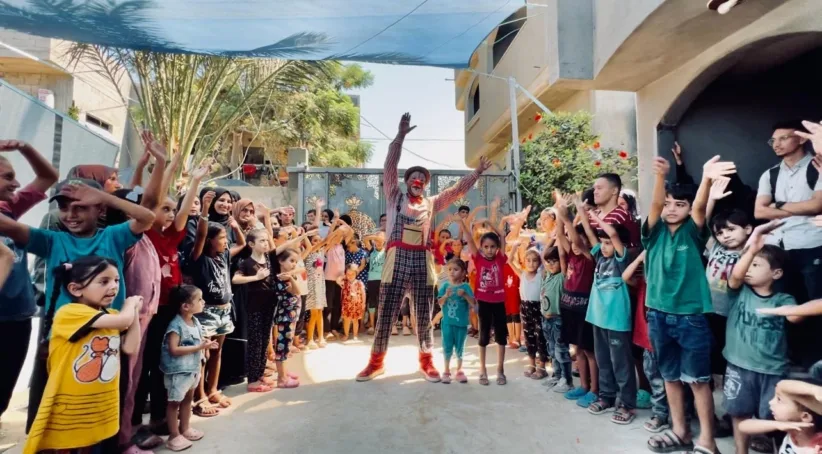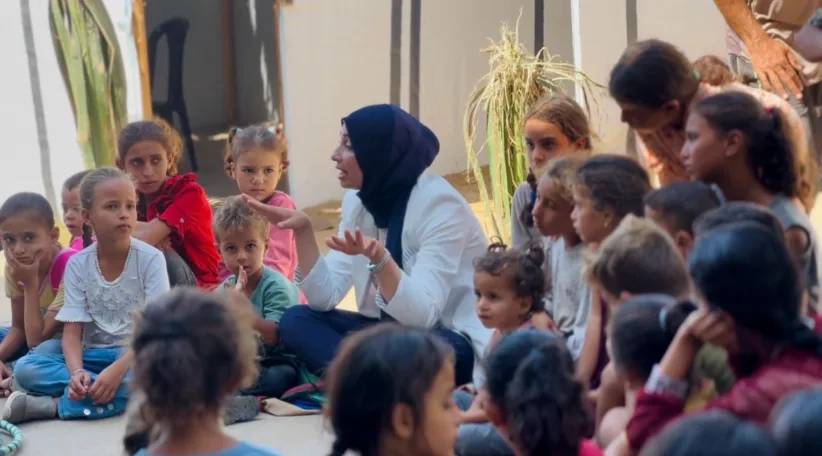How Basmet Amal Camp Provides Safety and Care for Cancer Patients Amid War
In an environment where war has targeted and destroyed medical infrastructure for the whole population in Gaza, it is undeniable that the most vulnerable among patients, like those with cancer are facing aggravated life-threatening conditions. Overcrowded hospitals, a shortage of essential medications and medical supplies, and deteriorating infrastructure have made treatment journeys nearly impossible. With the ongoing displacement and suffering caused by continuous conflict for the second consecutive year, the challenges have grown exponentially, placing extraordinary burdens on the patient’s families and confronting them with daily uncertainty, fear and hardships.

A safe haven
”Basmet Amal Camp” emerged as a safe haven from this grim reality, to offer cancer patients, their children and their families safe shelter in the middle of the war, as well as the care and hope they have been deprived of for too long. Located in Deir al-Balah in central Gaza, “Basmet Amal Camp” was established by AISHA (Association for the Protection of Women and Children) in partnership with the Basmet Amal Association for Cancer Care in the first year of the war. The camp stands as an oasis of hope in a setting surrounded by trees and is shaded by protective canopies to shield residents from the scorching sun and provides essential living necessities, including two water wells—which has become an invaluable resource amid Gaza's persistent water scarcity and contamination issues derived from the war.
The camp hosts 36 cancer patients (including women and girls SGBV survivors and unaccompanied children) and their families, making it a refuge for 250 individuals who live together and have developed support networks like one big family, sharing daily tasks, lightening each other’s burdens, and celebrating special occasions together. This sense of belonging extends to an additional 750 families affiliated with the association, who find support and solace during difficult times.

"When I joined the camp, I finally felt the security and privacy I lost in the war," said one woman, expressing the transformation the camp brought to her life. Beyond being simply a shelter, the camp offers a comprehensive intervention system that instils a sense of safety and reassurance to those suffocated by the harshness of sickness and war.
The camp includes a team of psychologists who provide individual and group counselling sessions to help patients cope with the pressures of illness and conflict, as well as a medical station, supervised by an oncologist, who ensures the provision of essential medications and necessary tests that are otherwise impossible to access outside the camp. It also serves residents from the surrounding areas. One beneficiary shared;
The camp doesn’t just give us treatment; it gives us the strength to keep going.
Schools and activity to keep the mind occupied
In addition to healthcare, the camp hosts educational workshops that enhance awareness of health and legal rights. Legal consultations are offered to help families resolve issues from complex domestic disputes to administrative issues such as obtaining official documents. One woman survivor of SGBV, who found refuge in the camp for herself and her daughters, said "the camp saved me and my daughters and gave us the protection we desperately needed."
Education is also a priority in the camp. A designated tent serves as a classroom for children, managed by specialized teachers to compensate for the education they lost due to the collapse of the educational system due to the war. Women benefit from fitness sessions led by a cancer survivor to boost their physical wellbeing, their circulation and improve their mental health through exercise. Every day, families gather in a designated play area where recreational activities create a joyful and harmonious atmosphere, restoring a semblance of normalcy to the lives of patients.
The camp also promotes self-reliance by providing temporary employment opportunities for its residents. They receive training in fields such as education, cooking, cleaning, and even assisting at the medical station, fostering a sense of value and the ability to contribute to their lives and the lives of those around them.